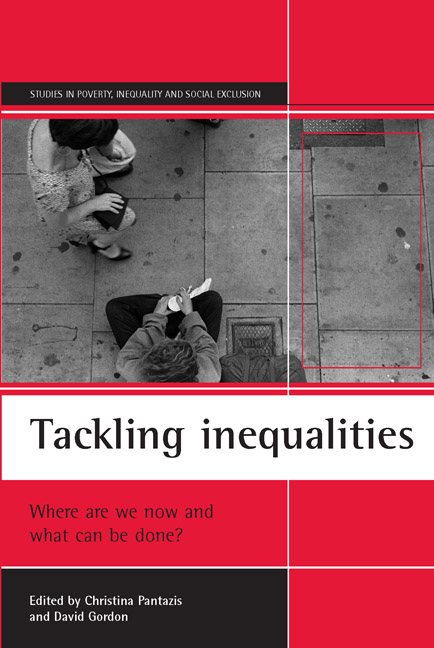Book contents
- Frontmatter
- Contents
- List of tables and figures
- Preface
- Acknowledgements
- List of acronyms
- Notes on contributors
- 1 Introduction
- 2 Inequalities in income, wealth and standard of living in Britain
- 3 Inequalities in employment: problems of spatial divergence
- 4 Educational inequalities and Education Action Zones
- 5 How can we end inequalities in housing?
- 6 Tackling inequalities in crime and social harm
- 7 Poverty across the life-course and health
- 8 Inequalities in health service provision: how research findings are ignored
- 9 A mortality league table for Cabinet ministers?
- 10 Ending world poverty in the 21st century
- Index
6 - Tackling inequalities in crime and social harm
Published online by Cambridge University Press: 05 July 2022
- Frontmatter
- Contents
- List of tables and figures
- Preface
- Acknowledgements
- List of acronyms
- Notes on contributors
- 1 Introduction
- 2 Inequalities in income, wealth and standard of living in Britain
- 3 Inequalities in employment: problems of spatial divergence
- 4 Educational inequalities and Education Action Zones
- 5 How can we end inequalities in housing?
- 6 Tackling inequalities in crime and social harm
- 7 Poverty across the life-course and health
- 8 Inequalities in health service provision: how research findings are ignored
- 9 A mortality league table for Cabinet ministers?
- 10 Ending world poverty in the 21st century
- Index
Summary
Introduction
New Labour's landslide victory in the 1997 Election has been partly attributed to the way in which it fought on the issues of ‘law and order’. Its adoption of a populist stance on these issues helped convince the electorate that it was the natural party of ‘law and order’ – a title which had been rigorously held by the Conservatives for nearly 20 years. Margaret Thatcher, in the 1979 Election, was especially successful in breaking the cross-party consensus on crime by questioning Labour's commitment to the rule of law, in particular to striking trade unions. For many years, until the transformation of the Labour Party, particularly under Tony Blair, the Labour Party was portrayed as being ‘soft on crime’. Its policies on crime and its premise that rising crime is linked to growing unemployment, poverty and inequality, was contrasted with the hardline and populist approach taken by the Conservatives. However, the appointment of Tony Blair to Shadow Home Secretary in 1992 changed that perception – with his famous soundbite of New Labour's promise to “be tough on crime, tough on the causes of crime”.
Invoking the third way approach (see Chapter One) New Labour has adopted a twin stance to deal with the problem of crime. Like the Conservatives, New Labour sees an important role for punishing offenders. Punishment not only acts as a deterrent to potential criminals, it also means that people take responsibility for their actions: “Recognising that there are underlying causes of crime is in no way to excuse or condone offending. Individuals must be held responsible for their own behaviour, and must be brought to justice and punished when they commit an offence” (Labour Party, 1996, p 6).
Like Old Labour, New Labour promises to be tough on the causes of crime. However, while Old Labour stresses factors relating to poverty, unemployment and racism to explain crime, New Labour prioritises factors relating to upbringing over broader social and economic explanations. This was clearly demonstrated in the Labour Party's document Tackling the causes of crime (1996), where it lists the causes of crime in the following order: parenting, schools and truancy, drug and alcohol abuse, lack of facilities for young people, unemployment, low income, and recession, homelessness and the treatment of the mentally ill.
Information
- Type
- Chapter
- Information
- Tackling InequalitiesWhere Are We Now and What Can Be Done?, pp. 117 - 140Publisher: Bristol University PressPrint publication year: 2000
